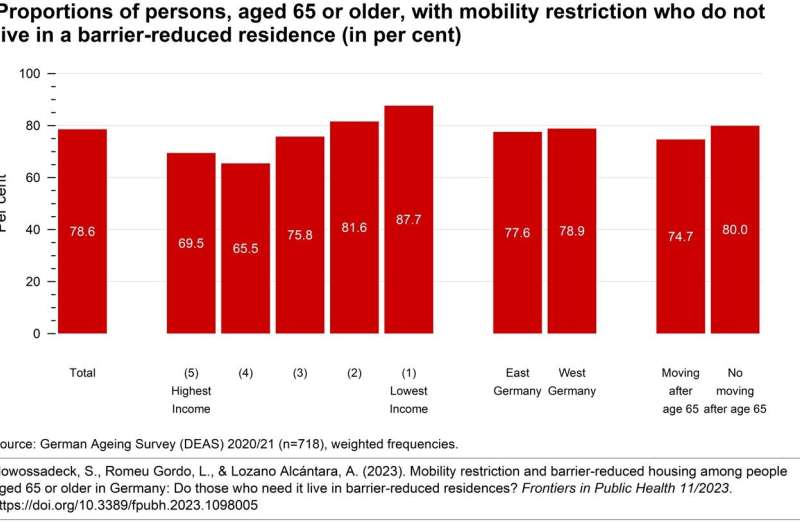This article has been reviewed according to Science X's editorial process and policies. Editors have highlighted the following attributes while ensuring the content's credibility:
fact-checked
peer-reviewed publication
proofread
Do those who need it most live in barrier-reduced residences?

Older people spend a lot of time at home and in the area near where they live. Housing conditions ensure their ability to participate in social life, especially when they suffer from mobility restrictions. Barrier-free access to the residence and to rooms within the residence is a key condition for their everyday mobility. But do the homes of those with limited mobility meet these requirements?
Most people live in their own private household into their old age. Even if seniors are functionally limited or require care, they seldom move to a more barrier-reduced home. With increasing age and health problems, older people reduce their radius of action and spend more time in their homes and the close neighborhood. At the same time, their vulnerability to deficiencies in the home and the living environment increases. For older people, the home and its environment therefore determine their level of self-determination as they age to a significant extent.
Scientists of the German Center of Gerontology used data from the German Aging Survey (DEAS) 2020/21 to examine, whether people aged 65 and older live in barrier-reduced residences, that is, whether access to the residence and to the rooms in the residence is without stairs and steps. In addition, they have examined whether specific factors, such as having mobility restrictions, correlate with the probability of having barrier-reduced access to their home. The paper is published in the journal Frontiers in Public Health.
Of all mobility-restricted respondents aged 65 or older, 76.8% do not live in a barrier-reduced residence. But there are differences between different population groups: For example East Germans and people who have not moved at the age of 65 or older, are less likely to live in a barrier-reduced home. And compared to the highest income group, older people in the lowest income group are less likely to live in barrier-reduced housing.
The findings show that not enough seniors have barrier-reduced access to their homes and rooms, even if they suffer from mobility restrictions. Policymakers in Germany have recognized that there is too little barrier-free housing and that the need will increase in view of demographic developments. But financial and other barriers keep these people from housing conditions that meet their needs, especially if they live in precarious financial conditions.
This is a problem that the German government is trying to address with a program that provides funding for the removal of barriers in existing buildings. However, the situation is worsened by the lack of affordable housing in general, especially in large cities and their agglomerations, which is an increasingly serious problem in Germany.
More information: Sonja Nowossadeck et al, Mobility restriction and barrier-reduced housing among people aged 65 or older in Germany: Do those who need it live in barrier-reduced residences?, Frontiers in Public Health (2023). DOI: 10.3389/fpubh.2023.1098005


















